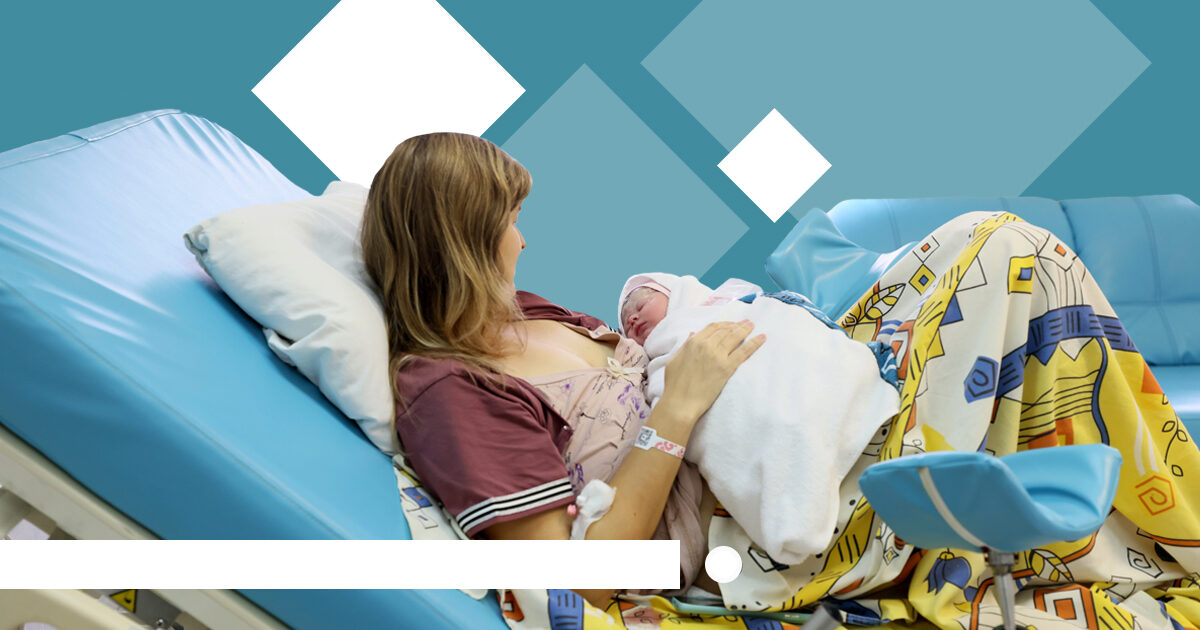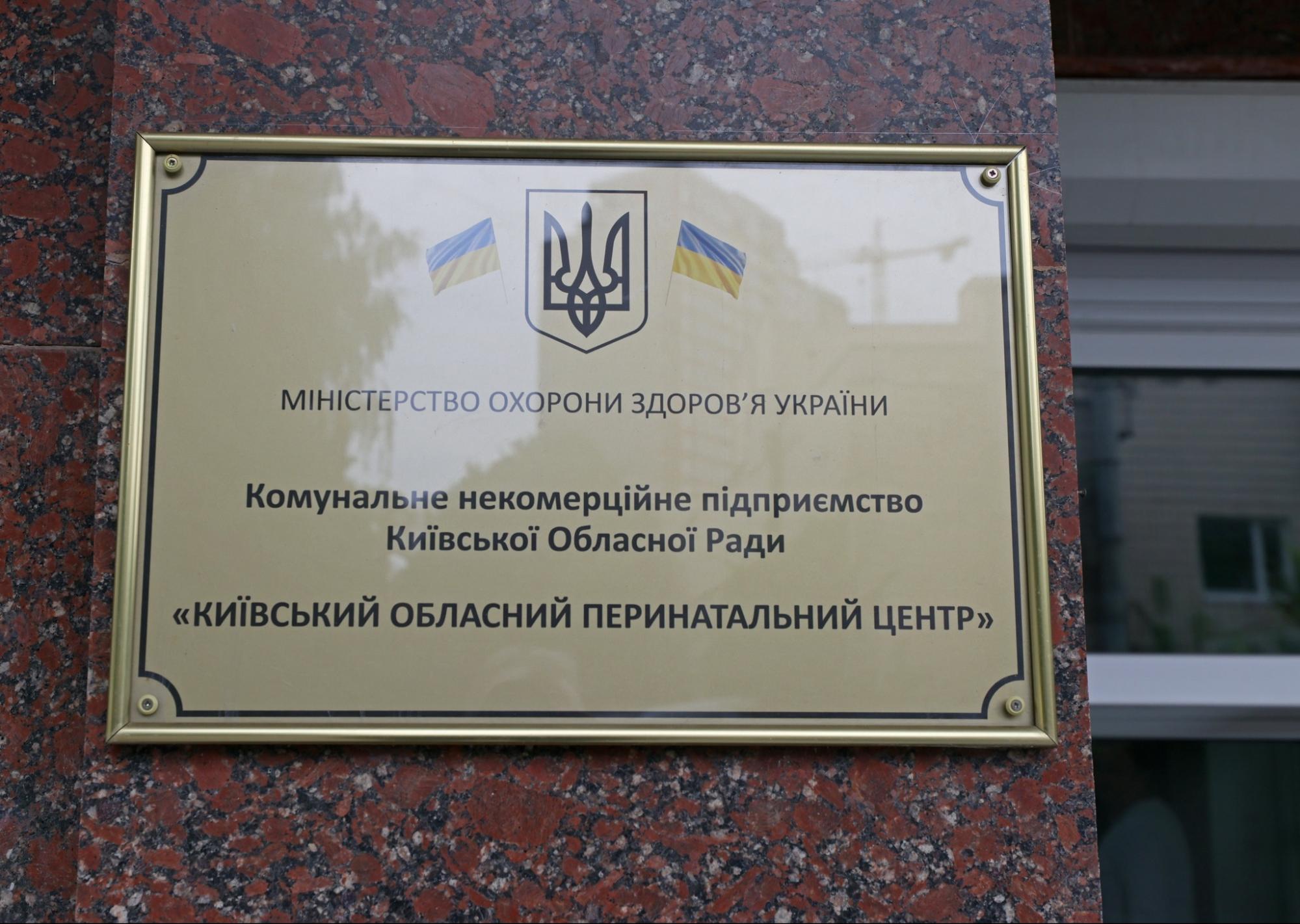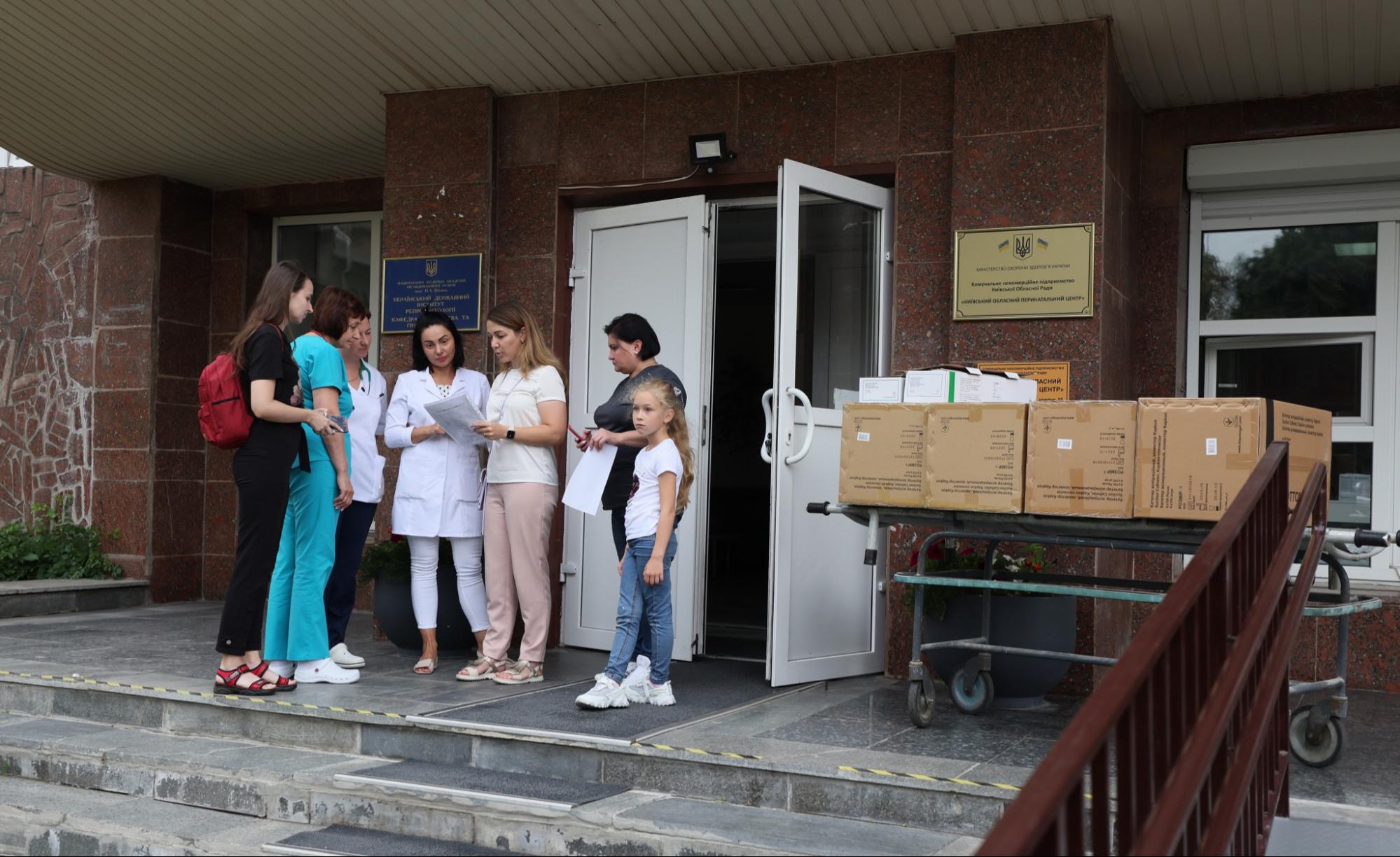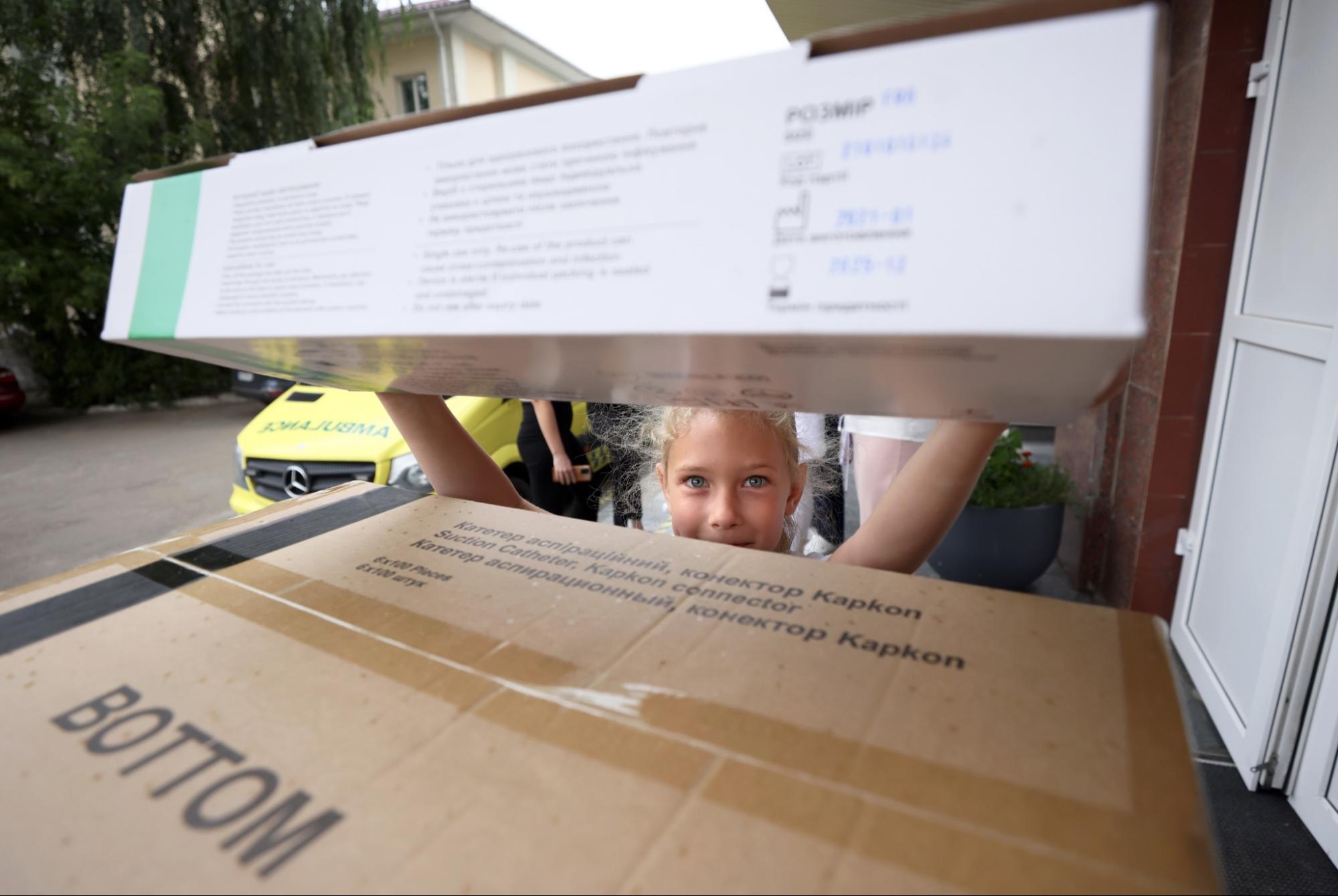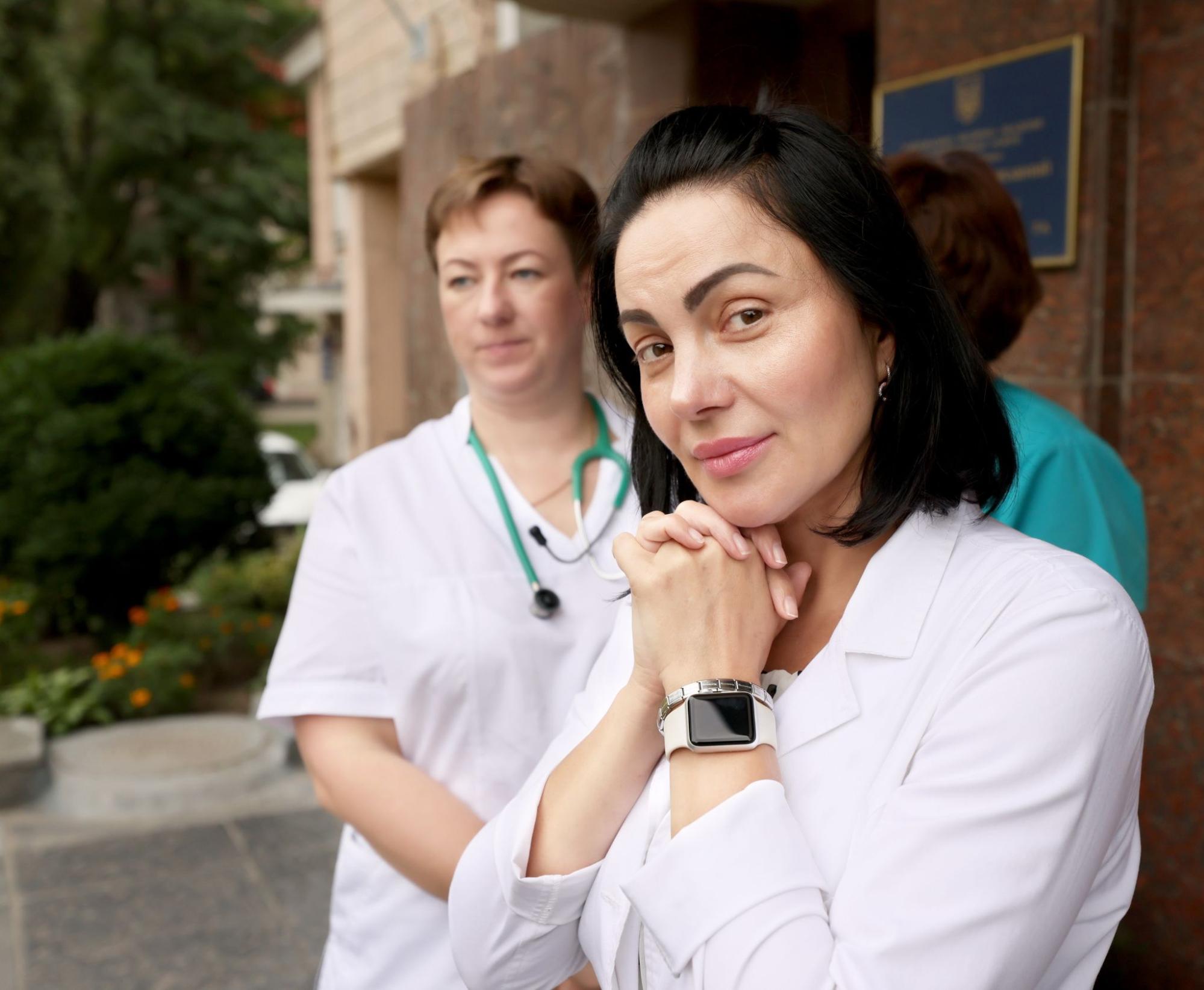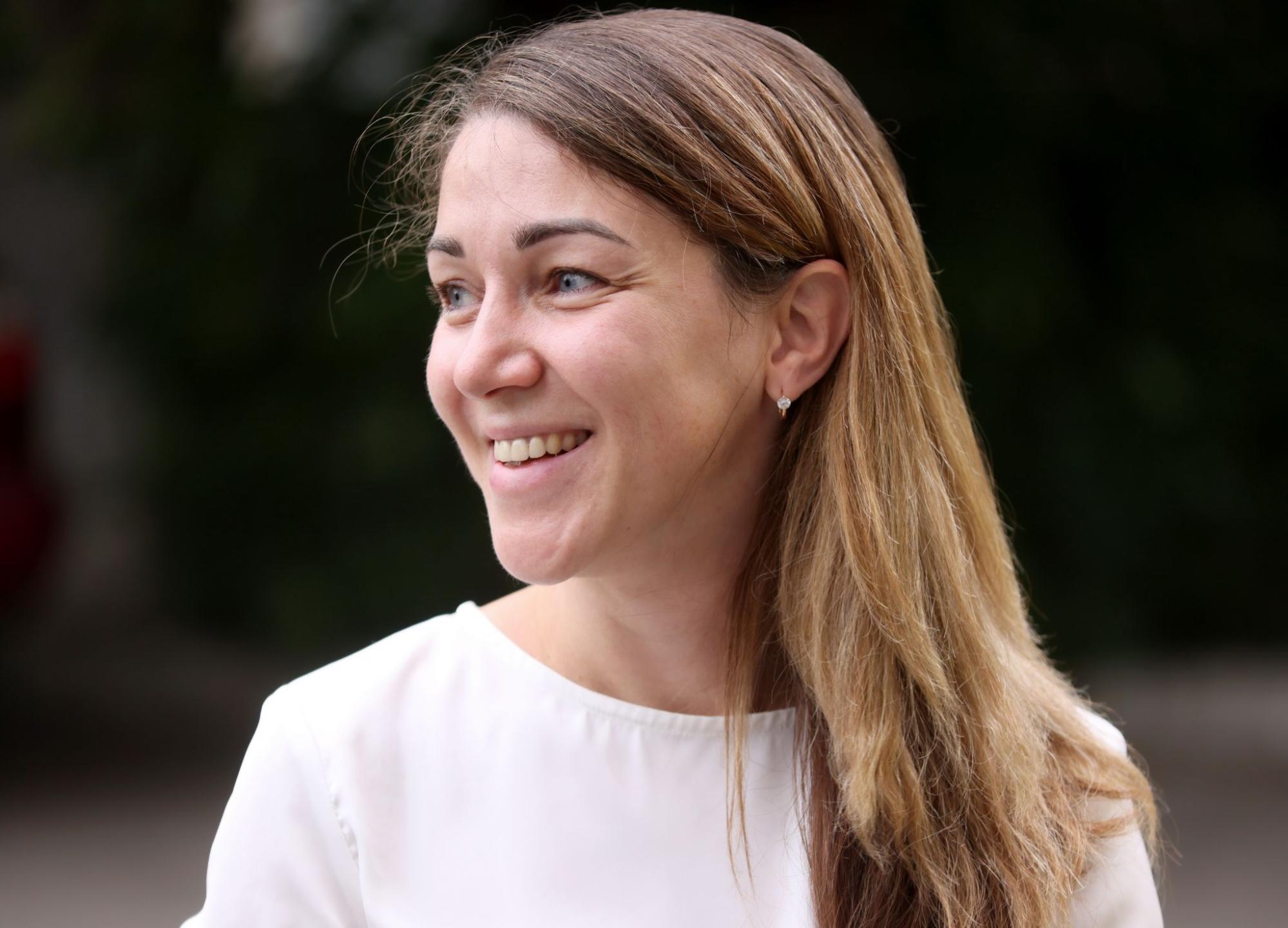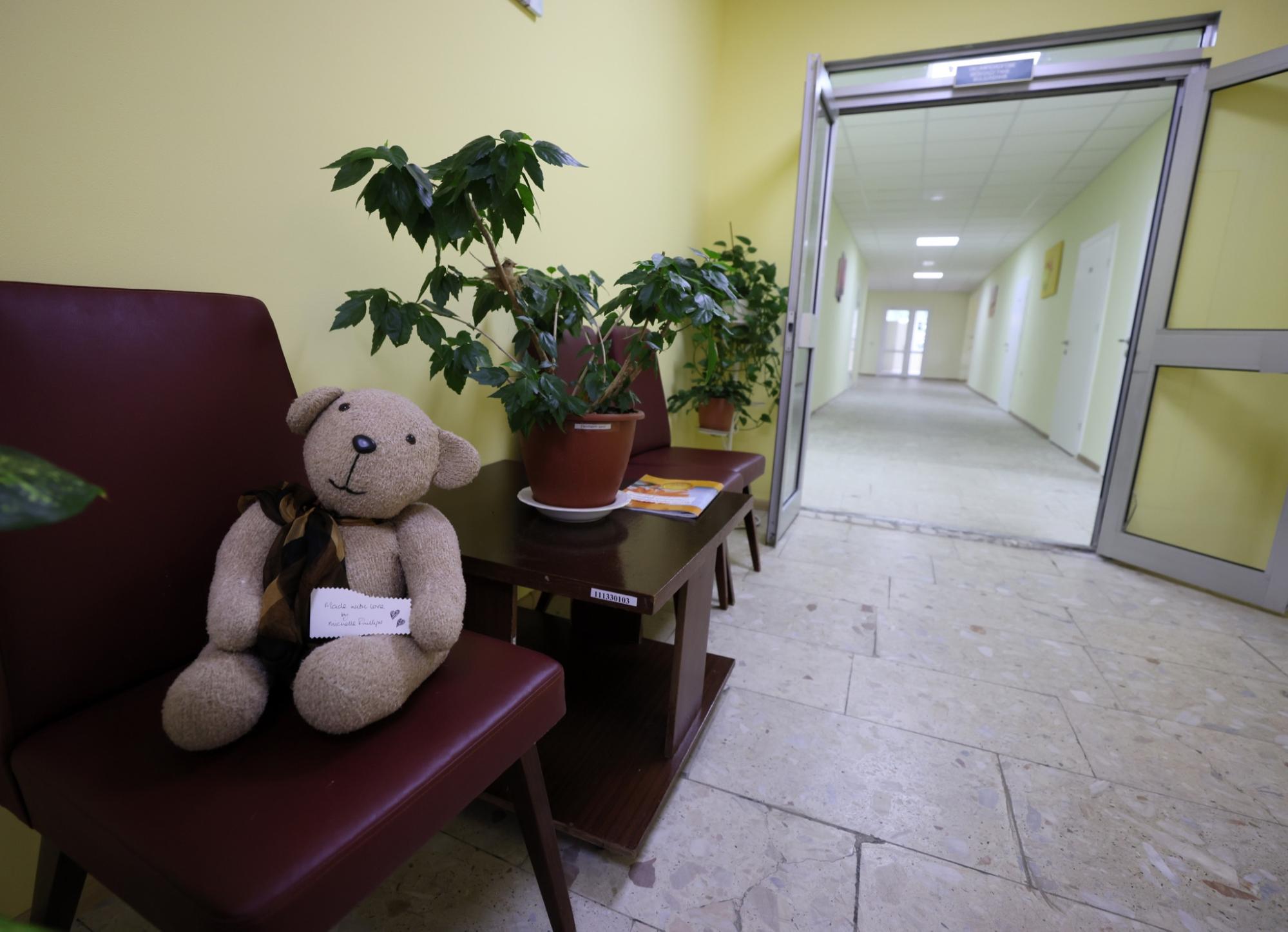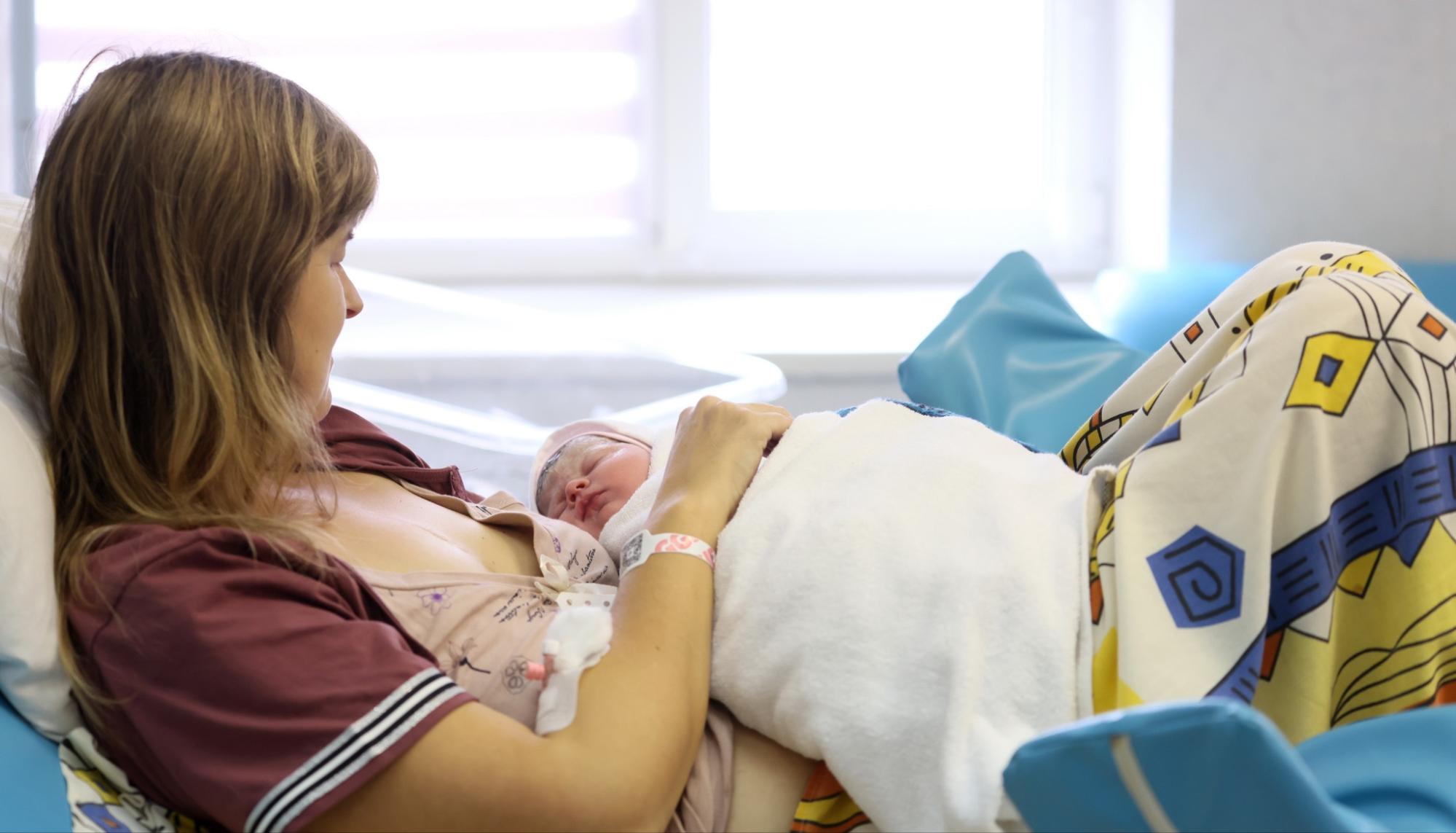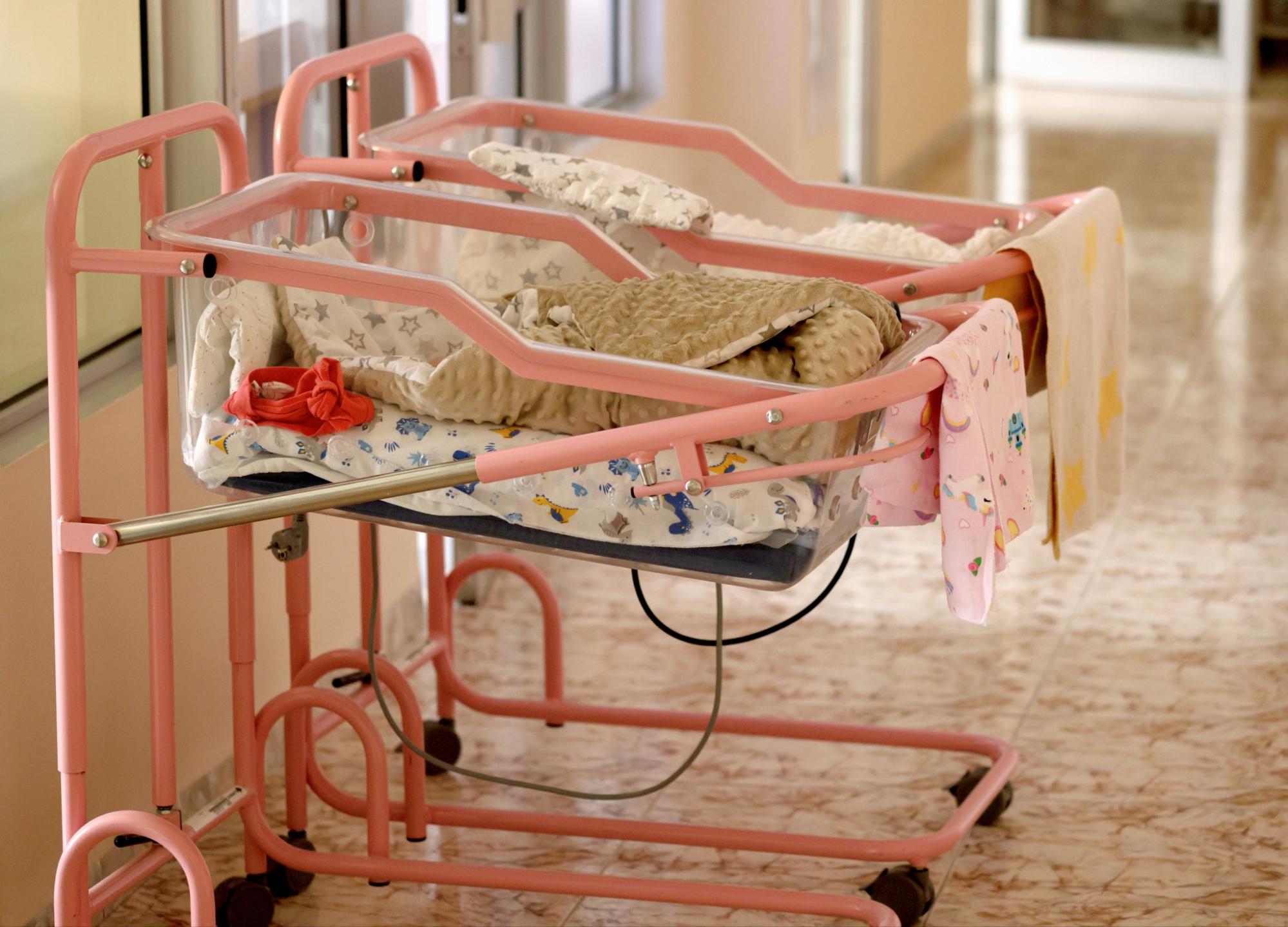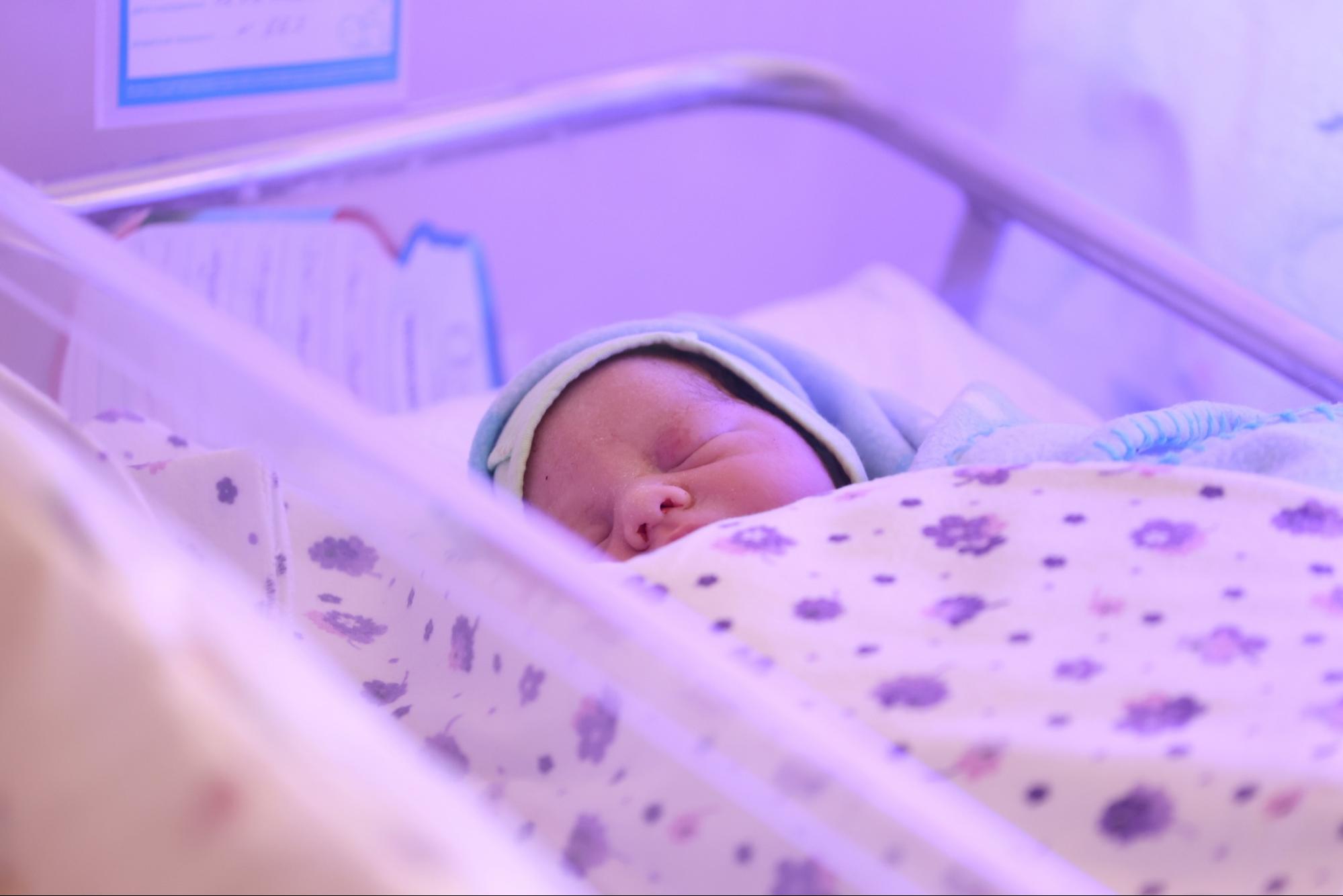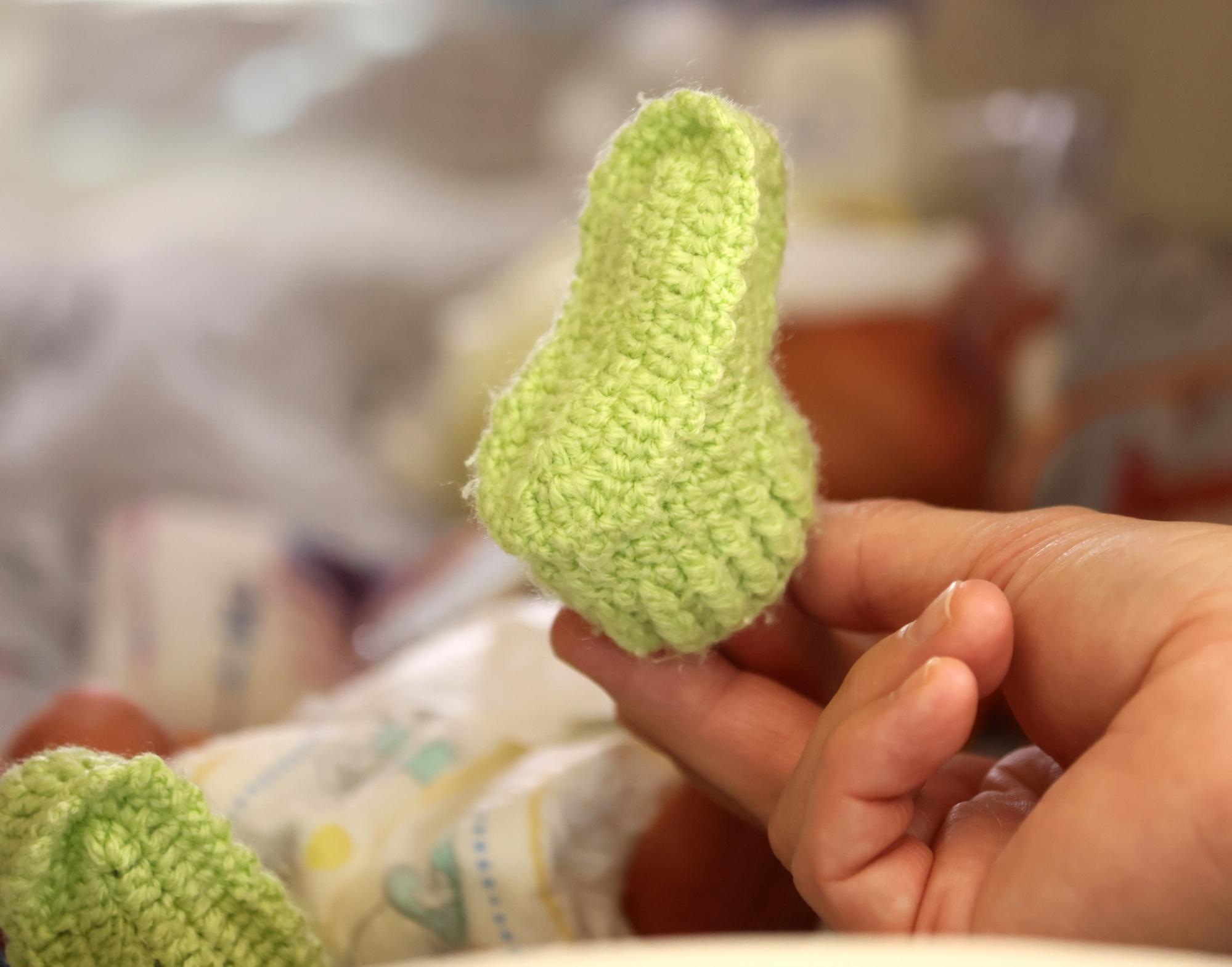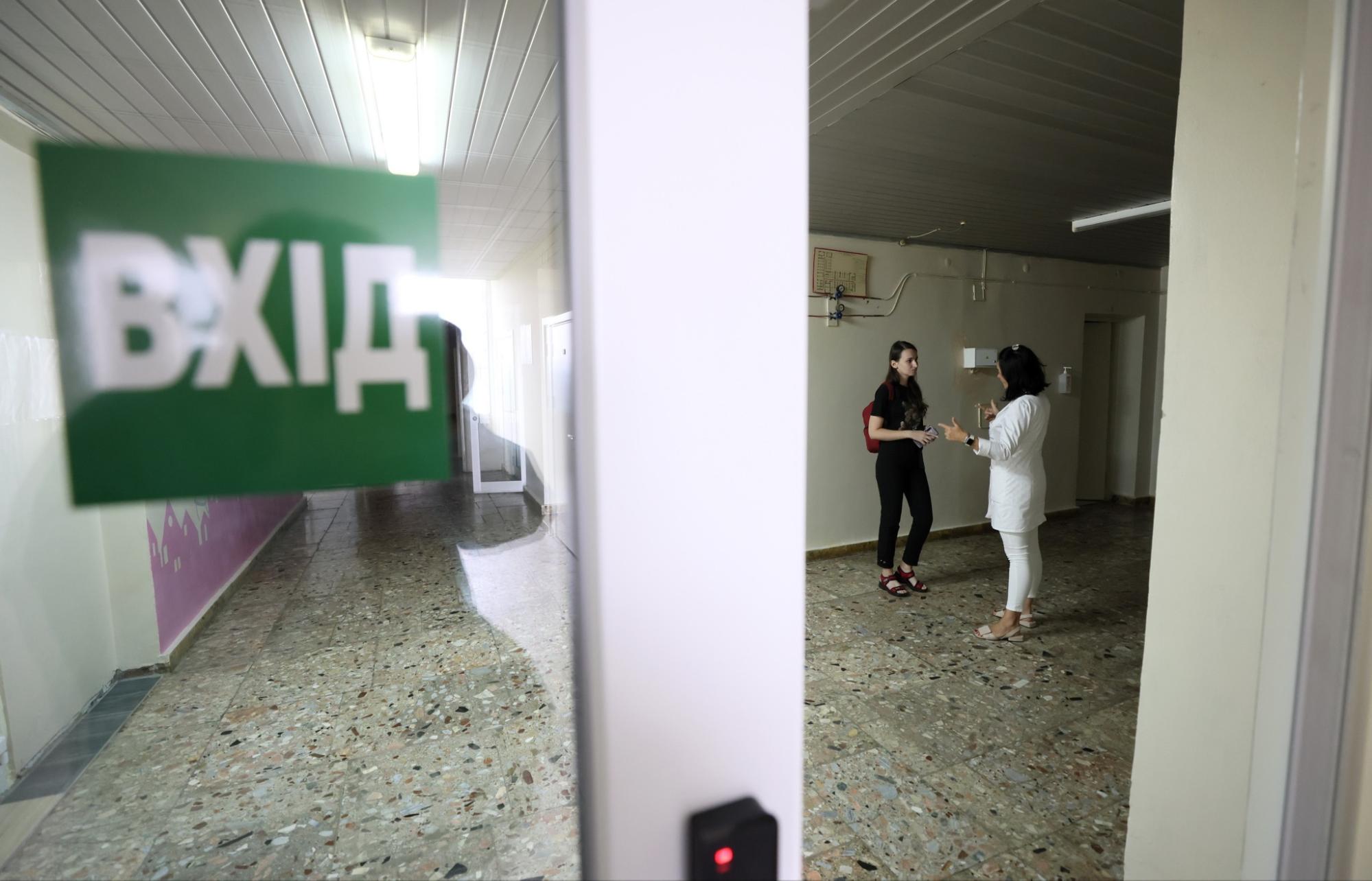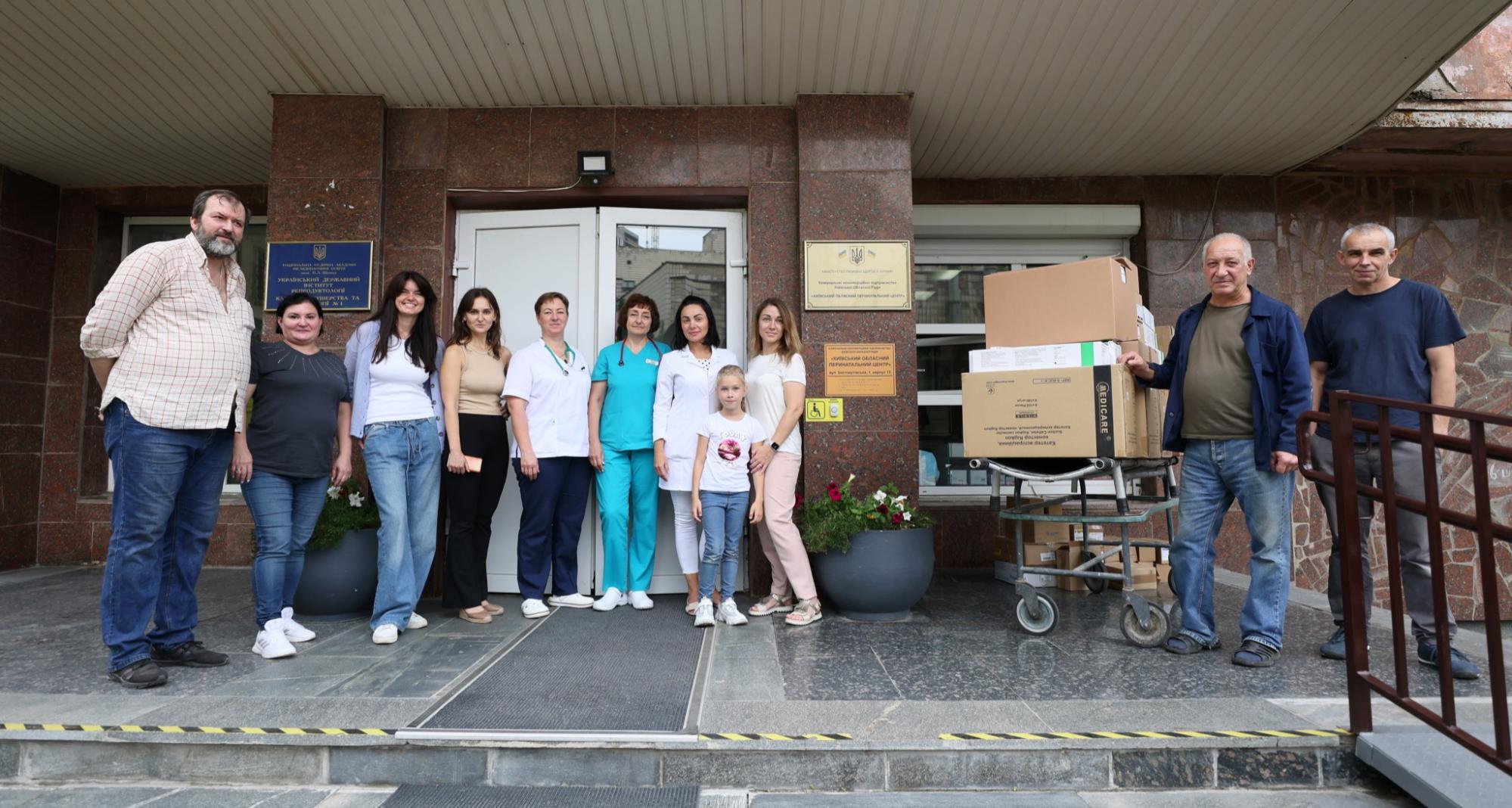
But how did the maternity hospital feel, whose staff on February 24 was reduced from three hundred people to fifteen? Rubryka visited the perinatal center with volunteers from Hennadii Butkevych's BGV Charity Fund and collected stories on defending a new life that is still very fragile and even more valuable.
Locked
The concrete walls of the regional maternity hospital on Bahhovutivska Street 1 are stretched high. The door is locked, and you can't see if there's any life inside through the windows. But it is there. And it is fought for here every day. It's just that they prefer to lock themselves away from the outside world from February 24.
When the BGV Charity Fund volunteers arrive, three women in white robes appear on the street in a few minutes. Behind them are three more employees. As the women say, "these are our boys."
"You know, my girls were not only on their feet around the clock in the operating and delivery rooms, and after they unloaded bags of potatoes and cooked them. There were not many people; everyone did what they could. And it doesn't matter if you're a surgeon, a neonatologist, or a chief doctor. Now we're protecting our backs."
Nowadays, Natalia Heints, the head of the hospital, looks cheerful. The woman smiles and talks incessantly about new mothers and those about to join their ranks. But it was only in April that the woman returned home for the first time from work, for which she left home on the morning of February 24. We will tell a story about this later.
Meanwhile, a few more doctors go out. They thoroughly examine the boxes with new probes and suction cups and explain what they are for.
"Children need these probes and suction cups every day. The baby cannot eat or spit up independently if it is premature or in critical condition. Therefore, one probe and about 8-10 suction cups are used daily. Volunteers help us all the time, but the requests are so specific we don't have any medical supplies," says one of the doctors.
Meanwhile, Kateryna, a volunteer of the BGV Charity Fund, takes out boxes from two cars wholly filled with them. She is helped by the foundation's youngest volunteer, Kateryna's daughter.
A few months before, the foundation brought three 20-ton trucks to Ukraine, which delivered 92,500 portions of food from Poland for Ukrainian babies. Thirty-two organizations—hospitals, orphanages, social service centers, city and village councils, partner charitable foundations, and public organizations—received help. That's how we got to know Mrs. Natalia and the perinatal center at the fund. There was plenty of food then, but there was a lack of specific medical supplies. Volunteer Kateryna Pokatska says:
"Purchasing medical supplies for philanthropists is very difficult. When I started searching for the names of the products in the request in Google, it turned out that there were a bunch of words that didn't match each other, and it was not clear what to order. Then, at the purchase stage, it turned out that we required certificates for all products. In addition, the volumes were wholesale. Usually, pharmacies do not have such quantities of specific products or solutions.
It also turned out that 'wholesalers' in pharmaceuticals are very conservative and will not work with pharmacy chains. So we had to look for companies that were not too lazy to collect the entire volume and sell it to us. We collected everything from several areas, and we didn't want anything to wait in the warehouse for a long time because every such product is about the safety and comfort of the baby."
To purchase everything necessary, the fund held several charity fundraisers abroad. In particular, during the Easter fair in Prague and a charity auction evening in London, the foundation exchanged children's drawings for monetary donations to support Ukraine. Having distributed hundreds of children's paintings and received the support of Europeans, representatives of the BGV Charity Fund managed to collect about UAH 165 thousand, which partially covered the costs of purchasing aid for the Kyiv Perinatal Center.
"I'm not going anywhere from here"
"On February 24, we all woke up to the news that the war had begun. It was a 10-minute drive from my house to the maternity hospital. But that day, it took me about an hour and a half to get to work. Our patients were panicking; everyone wanted to be discharged en masse. We released many women that day. However, no one understood where to run. Only patients who had the most complex extragenital pathology stayed.
We also faced the fact that employees also started to leave. Many have children, and those children had to be saved. And only 15 of us were left—management, obstetricians-gynecologists, anesthesiologists, pediatricians, and nurses.
There were times when there was no nurse for 3-4 days, and we had to treat, cook, wash, unload cars, and wash wards. But the worst thing is panic among patients," says Ms. Natalia.
She recalls the day when an exhausted woman appeared in the hospital lobby at the beginning of the invasion. Her body was already noticeably heavier; her stomach was large and slightly lowered. It was her 34th week of pregnancy, the eighth month.
A woman walked more than a hundred kilometers to no longer fear a possible occupation and to give birth to a child where she would be cared for.
"Can you imagine how in the 34th week you can walk to Kyiv from Yahotyn? Because I don't know how. This woman's husband is a military man and was already in the war, and she decided that she had to get to the perinatal center no matter what.
When she came, she sat down, exhaled, and said: 'I will not go anywhere from here.' All is fine; she gave birth to a healthy baby, and before giving birth, she became a member of our family here. The Kyiv region was already de-occupied," Ms. Natalia recalls.
"During the first air raid, we almost lost two children"
You don't need to have complications to give birth in this hospital. But if there are complications and they are serious, then you need to go here. It is here that doctors have the appropriate qualifications and equipment to treat babies who are born prematurely. And it is here that women who want to give birth despite infertility and other health problems are taken for granted.
While we walk through the spacious corridors of the medical facility, one of the doctors, Ms. Anna, tells us that when the Kyiv region was still occupied and under active shelling, the perinatal center received women together with men who escaped from the occupation on foot through the forests, newborn babies whose mothers had to stay in basements, and pregnant women with complications refused by other hospitals.
"When babies are born prematurely, they need further monitoring of their condition. Our stage ends at the weaning stage, but these babies, as a rule, still need additional monitoring by narrow specialists after discharge from the maternity ward.
Unfortunately, not everywhere has departments that can assist such children. But specifically for our hospital, this is one of the main tasks," says Anna.
The record of the hospital is a girl who was born with a weight of 620 grams. They managed to save the child. Raising such children becomes a significant challenge during the active phase of hostilities.
"Our basements are not intended for life, childbirth, or an extended stay. We immediately transformed our basement into a temporary delivery room and a temporary operating room; we set up pediatric intensive care there and brought the breathing apparatus.
But at that time, we had four oxygen-dependent children who were on artificial ventilation. And at the first aid raid siren, we almost lost two children. Therefore, we decided that until we purchase oxygen concentrators, they will be with the team, despite everything, on the seventh floor in the intensive care unit. We installed equipment between the load-bearing walls and stayed with the children like that.
Besides, it was February, it was freezing outside, and so was the basement. Women refused to give birth there, and that is understandable. We delivered only a few births in the basement during all this time. And we, heating the premises, gave preference to wards with children and delivery rooms," says head doctor Natalia Heints.
The story of one of those women in labor who met motherhood in the basement stuck in Mrs. Natalia's memory the most.
"Someone is persistently knocking at our door"
February 23. Phrases from conversations about emergency suitcases are floating around. But you still don't believe in a "great" war, especially when you check in the maternity ward to give birth to a new life. How can it be infringed upon? But February 24 comes. One of the patients cannot find a place in one of the wards because her husband stayed home. Communication with him was cut off with the first rockets.
"She had been infertile for many years, and this pregnancy was tough. And finally, she came to our center to give birth. When the full-scale attack began, she was here, and her husband was in Irpin. When she gave birth, she knew nothing about him or whether he was alive.
After giving birth, she never came out of the basement. She was constantly there with the child and had no information about her husband for ten days. Even the birth of a child didn't gladden her. She was always crying and withdrawing into herself," says the doctor.
In the meantime, the newly-made father made his way out of occupied Irpin via forest paths, hiding from the russian military and not having any opportunity to let her be known that he was alive.
"And then on day ten at 10 pm, someone persistently knocked on our door. We opened it, and a man was standing in front of us; his face was red, wet, sweaty, his hat was on one side, his clothes were dirty… And this girl comes out. I can't describe this meeting in any words. They couldn't separate their hugs for 15 minutes, and I just stood and cried with them," Natalia recalls.
The russians destroyed the family's house. For a few more weeks, the couple and the child lived in the maternity ward until the doctors found volunteers who helped the family with housing. Now the trio lives in the Lviv region.
"On the second day, the food suppliers refused us"
Only 15 of the 300 who worked at the hospital remained at work, so work became 24 hours daily. Doctors helped nurses, and everyone cooked, cleaned, and treated patients.
"Infrastructure, transport supplies, interactions were collapsing… On the second day after the start of hostilities, food suppliers refused us because they couldn't provide the necessary quantities. Our patients needed breakfast, lunch, and dinner, so we turned to volunteers. We thank everyone and can't express this gratitude in words. Every volunteer who came to us in the first days we met with tears in our eyes. These are not just words; it was true.
They brought us potatoes, carrots, onions, milk, cereals, and canned goods. People came from the west of Ukraine on their buses; in the morning, they baked pies and fried meatballs, and in a few hours, we had it, and it was still warm!"
Meanwhile, the percentage of premature births rose from a paltry 18 to a solid 23. Many hospital workers were under occupation and delivered and provided other care in the captured cities. People in the hospital barely came out. The head doctor saw her home one and a half or two months after the russian attack in February.
"We worked around the clock. It wasn't easy, but people probably don't talk about it. We just had to hold on so that the hospital would go through it. I have 27 years of experience as an obstetrician-gynecologist. I had to assist in both the operating rooms and the delivery rooms. I didn't feel that it was difficult at the time. I was happy every time I managed to help a woman give birth to a baby. That helped me to hold on.
Even if you stand at the operating table and explosions are outside the window, you have no right to leave because the person on that table now depends on you. When you come to medicine, you must be aware of the consequences: there are no days off, no holidays, and you belong to people. And this is not our merit; we must be born with it and learn to live with it," says Ms. Natalia. And, probably, that's how it is.
The BGV Charity Fund said that during communication with the fund, the doctors precisely emphasized that they have a catastrophic lack of consumables. That's why they bought them.
Consumable materials for delivery include umbilical catheters, intravenous cannulas, aspiration catheters, feeding catheters, syringes, and solutions for premature babies. In total, the fund handed over more than 6,000 products for the total amount of almost UAH 300,000.
Reference: The BGV Charity Fund was created by representatives of the BGV Group Management investment group to help Ukraine during the war and rebuild the country after the victory. Since the first weeks of russia's full-scale invasion of Ukraine, the fund has been providing humanitarian support to Ukrainians, involving international companies. One of the fund's main directions is assisting hospitals and families with newborn children. In particular, a project is ongoing within the scope of which such families can receive targeted assistance in the form of kits with essential products for the mother and baby in the first months after childbirth.
Newsletter
Digest of the most interesting news: just about the main thing




